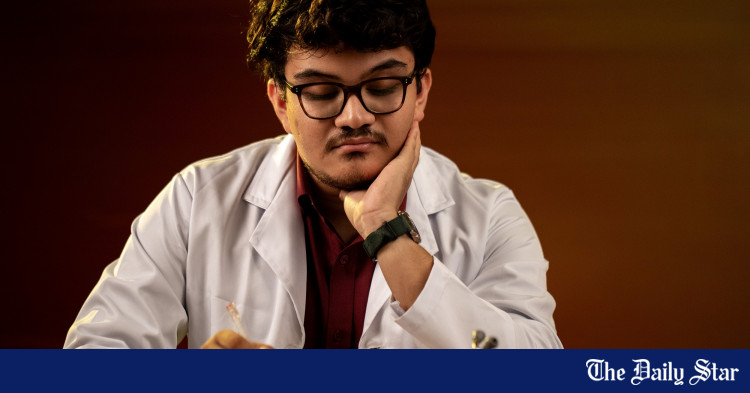Photo: Orchid Chakma
“>
Photo: Orchid Chakma
Bangladesh has earned a reputation for being a hub of medical education on the undergraduate level in this region of the world. Every year MBBS aspirants from Nepal, Bhutan, India, Pakistan, and even Malaysia get admitted into our medical colleges. We have about 37 public medical colleges alongside 67 private medical colleges in the country offering about 11420 undergraduate seats in total.
The Directorate General of Medical Education (DGME) supervises these colleges while the Bangladesh Medical and Dental Council (BMDC) provides the curriculum. A central medical admission test held every year by the DGHS provides a ranked list which they then use to assign a medical college to an applicant based on the student’s rank and the college’s demand.
Previously, this rule only applied to the 5380 seats in public medical colleges. Private colleges could negotiate with students on tuition in accordance with their rank. The tuition hovers in the range of 30 lacs to 45lacs in BDT for the entire course with most colleges requiring 20-24 lacs of advance payment.
However, allegations were raised that private medical colleges were taking in lower-ranking students for higher pay overlooking the merit score. For these reasons, from the 2022-23 session, the DGHS affirmed that the merit-based allotment system, previously in use to assign seats in public medical colleges, would extend to private medical colleges as well. This was done to establish a meritocratic system that would be fair to the students.
This year, however, the Bangladesh Private Medical College Association (BPMCA) has reported 1200 vacant seats in their medical colleges while the number is around 635 according to statistics provided by the health ministry. Even so, only 242 seats were vacant according to the Ministry in 2022-23 which means there is a threefold rise in the number of vacant seats. Of 6040 seats offered by private medical colleges, a staggering 20 percent seats remain vacant.
Photo: Orchid Chakma
“>
Photo: Orchid Chakma
Seats being vacant was unimaginable a few years back yet now private medical colleges in the capital are also facing a crisis of students. Faria, a student of Dhaka Community Medical College said, “87 applicants were admitted against 100 seats this year in our college. 13 seats remain vacant. This is the condition up till June.”
Dhaka Community Medical College is one of the reputed private colleges in the capital. The condition in some colleges outside the capital is even worse. It is evident to many aspirants that we currently do not possess the infrastructure to provide the graduating doctors with employment or postgraduate opportunities. Without the assurance of a stable future, students aren’t willing to pay the high course fees and are choosing to pursue other degrees.
Fresh MBBS graduates face a very difficult and uncertain future. After spending 5 years to complete one of the hardest undergraduate degrees, they have to face near insurmountable odds again to get a job.
If a graduate wants to seek a job right away, then the starting salary is around BDT 15 to 20 thousand a month. A more lucrative position is to join as a BCS Health cadre. But even in the 45th BCS, only 539 individuals were selected. Realising that there is a higher salary for specialists, a graduate may then choose to pursue a postgraduate degree. But here too there remains a bottleneck.
According to data provided by the Ministry of Health and Family Welfare’s Human Resources Development Unit, some 2042 seats are available for pursuing a postgraduate in the 20 national institutes and 10 medical colleges. The number increases by another 1300 or 1400 including FCPS programs offered under the Bangladesh College of Physicians and Surgeons (BCPS ) which means there are around 3500 seats for pursuing a postgraduate in this country against over 11 thousand graduates every year. This imbalance leads to frustration among MBBS graduates.
Photo: Orchid Chakma
“>
Photo: Orchid Chakma
When asked about his anxieties as a fresh MBBS graduate, Dr Rashed*, a graduate of the 2015-16 session said, “The number of undergraduate seats has gone up along with the need for doctors in our country. The number of medical colleges has also gone up and in turn the number of intern doctors passing out every year. The problem is despite public demand, we currently do not possess the infrastructure to employ all of them.”
Regarding the postgraduate opportunities and the compensation being offered to postgraduate trainees, Dr Rashed further added, “The number of postgraduate seats has increased, but the competition is still fierce. The chance of getting in is slim and the chance of getting into a subject you prefer is slimmer still. For those who get in, they’re offered a meager salary of 30 thousand a month. There have been protests over this but the compensation wasn’t raised substantially. They’re barred from private practice too. How can a 26/27-year-old doctor support his own expenses let alone the expenses of his family with this? We need a stable source of income and we need more postgraduate seats”
There is a particular lack of postgraduate seats in the eight basic subjects of MBBS curriculum – Anatomy, Physiology, Biochemistry, Community Medicine, Forensic Medicine, Pathology, Microbiology, and Pharmacology. These subjects are vital to medical education. However, with limited opportunities for high-paying jobs and clinical practice, very few fresh graduates choose to pursue a career in these subjects.






